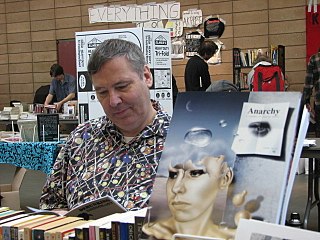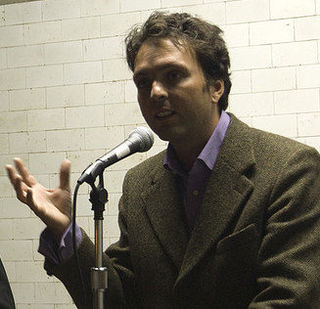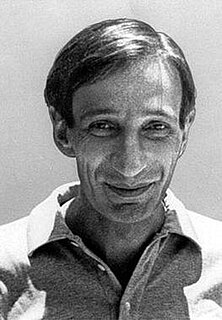 W
WAlphonse Gallaud de la Pérouse, better known as Zo d'Axa, was a French adventurer, anti-militarist, satirist, journalist, and founder of two of the most legendary French magazines, L'EnDehors and La Feuille. A descendant of the famous French navigator Jean-François de Galaup, comte de Lapérouse, he was one of the most prominent French individualist anarchists at the turn of the 20th century.
 W
WMikhail Alexandrovich Bakunin was a Russian revolutionary anarchist, socialist and founder of collectivist anarchism. He is considered among the most influential figures of anarchism and a major founder of the revolutionary socialist and social anarchist tradition. Bakunin's prestige as a revolutionary also made him one of the most famous ideologues in Europe, gaining substantial influence among radicals throughout Russia and Europe.
 W
WRobert Charles Black Jr. is an American author and anarchist. He is the author of the books The Abolition of Work and Other Essays, Beneath the Underground, Friendly Fire, Anarchy After Leftism, and Defacing the Currency, and numerous political essays.
 W
WRichard Buckminster Fuller was an American architect, systems theorist, author, designer, inventor, and futurist. He styled his name as R. Buckminster Fuller in his writings, publishing more than 30 books and coining or popularizing such terms as "Spaceship Earth", "Dymaxion", "ephemeralization", "synergetics", and "tensegrity".
 W
WTom Hodgkinson is a British writer, and the editor of The Idler, which he established in 1993 with his friend Gavin Pretor-Pinney. His philosophy, in his published books and articles, is of a relaxed approach to life, enjoying it as it comes rather than toiling for an imagined better future. The Idler was originally a series of essays written by Dr Johnson from 1758 to 1760.
 W
WAbbot Howard Hoffman, better known as Abbie Hoffman, was an American political and social activist who co-founded the Youth International Party ("Yippies"). He was also a leading proponent of the Flower Power movement.
 W
WIvan Dominic Illich was a Roman Catholic priest, theologian, philosopher, and social critic. His 1971 book Deschooling Society criticises modern society's institutional approach to education, an approach that allegedly constrains learning to narrow situations in a fairly short period of the human lifespan. His 1975 book Medical Nemesis, importing to the sociology of medicine the concept of medical harm, alleges that industrialised society widely impairs quality of life by overmedicalising life, pathologizing normal conditions, creating false dependency, and limiting other solutions more healthful. Illich called himself "an errant pilgrim."
 W
WNaphtali "Tuli" Kupferberg was an American counterculture poet, author, singer, cartoonist, pacifist anarchist, publisher, and co-founder of the band The Fugs.
 W
WPaul Lafargue was a French revolutionary Marxist socialist journalist, literary critic, political writer and activist; he was Karl Marx's son-in-law having married his second daughter, Laura. His best known work is The Right to Be Lazy. Born in Cuba to French and Creole parents, Lafargue spent most of his life in France, with periods in England and Spain. At the age of 69, he and 66-year-old Laura died together by a suicide pact.
 W
WHerbert Marcuse was a German-American philosopher, sociologist, and political theorist, associated with the Frankfurt School of critical theory. Born in Berlin, Marcuse studied at the Humboldt University of Berlin and then at Freiburg, where he received his PhD. He was a prominent figure in the Frankfurt-based Institute for Social Research – what later became known as the Frankfurt School. He was married to Sophie Wertheim (1924–1951), Inge Neumann (1955–1973), and Erica Sherover (1976–1979). In his written works, he criticized capitalism, modern technology, Soviet Communism and entertainment culture, arguing that they represent new forms of social control.
 W
WKarl Heinrich Marx was a German philosopher, economist, historian, sociologist, political theorist, journalist and socialist revolutionary. Born in Trier, Germany, Marx studied law and philosophy at university. He married Jenny von Westphalen in 1843. Due to his political publications, Marx became stateless and lived in exile with his wife and children in London for decades, where he continued to develop his thought in collaboration with German thinker Friedrich Engels and publish his writings, researching in the reading room of the British Museum. His best-known titles are the 1848 pamphlet The Communist Manifesto and the three-volume Das Kapital (1867–1883). Marx's political and philosophical thought had enormous influence on subsequent intellectual, economic and political history. His name has been used as an adjective, a noun and a school of social theory.
 W
WWalery Karłowicz Mroczkowski was a Polish insurgent in the 1863 January Uprising. He was arrested and imprisoned by the Prussian authorities. Upon release in 1865, he was sent into exile and travelled to Italy, Switzerland, London and finally settled in France. While in Florence he met Mikhail Bakunin and became an anarchist and a member of the latter's close circle. He is also known as a portrait photographer in France, working under the pseudonym, "Ostroga" or "Valerien Ostroga".
 W
WAntonio "Toni" Negri is an Italian Spinozistic-Marxist sociologist and political philosopher, best known for his co-authorship of Empire and secondarily for his work on Spinoza.
 W
WFriedrich Wilhelm Nietzsche was a German philosopher, cultural critic, composer, poet, and philologist whose work has exerted a profound influence on modern intellectual history. He began his career as a classical philologist before turning to philosophy. He became the youngest person ever to hold the Chair of Classical Philology at the University of Basel in 1869 at the age of 24. Nietzsche resigned in 1879 due to health problems that plagued him most of his life; he completed much of his core writing in the following decade. In 1889, at age 44, he suffered a collapse and afterward a complete loss of his mental faculties. He lived his remaining years in the care of his mother until her death in 1897 and then with his sister Elisabeth Förster-Nietzsche. Nietzsche died in 1900.
 W
WAbele Rizieri Ferrari, better known by the pen name Renzo Novatore, was an Italian individualist anarchist, illegalist and anti-fascist poet, philosopher and militant, now mostly known for his posthumously published book Toward the Creative Nothing and associated with ultra-modernist trends of futurism. His thought is influenced by Max Stirner, Friedrich Nietzsche, Georges Palante, Oscar Wilde, Henrik Ibsen, Arthur Schopenhauer and Charles Baudelaire.
 W
WPierre-Joseph Proudhon was a French socialist, politician, philosopher, economist and the founder of mutualist philosophy. He was the first person to declare himself an anarchist, using that term and is widely regarded as one of anarchism's most influential theorists. Proudhon is considered by many to be the "father of anarchism". Proudhon became a member of the French Parliament after the Revolution of 1848, whereafter he referred to himself as a federalist. Proudhon described the liberty he pursued as "the synthesis of communism and property". Some consider his mutualism to be part of individualist anarchism while others regard it to be part of social anarchism.
 W
WThe Rainbow Family of Living Light is a counter-culture, in existence since approximately 1970. It is a loose affiliation of individuals, some nomadic, generally asserting that it has no leader. They put on yearly, primitive camping events on public land known as Rainbow Gatherings.
 W
WJerry Clyde Rubin was an American social activist, anti-war leader, and counterculture icon during the 1960s and 1970s. During the 1980s, he became a successful businessman. He is known for being one of the co-founders of the Youth International Party (YIP), whose members were referred to as Yippies.
 W
WBertrand Arthur William Russell, 3rd Earl Russell was a British polymath, philosopher, logician, mathematician, historian, writer, social critic, political activist, and Nobel laureate. Throughout his life, Russell considered himself a liberal, a socialist and a pacifist, although he also sometimes suggested that his sceptical nature had led him to feel that he had "never been any of these things, in any profound sense". Russell was born in Monmouthshire into one of the most prominent aristocratic families in the United Kingdom.
 W
WSarah Margaret "Molly" Scott Cato is a British Green politician, academic, environmental and community activist, and green economist. She served as a Member of the European Parliament (MEP) for the South West England from 2014 to 2020. From 2012, until her election as an MEP, she was Professor of Strategy and Sustainability at the University of Roehampton. Scott Cato speaks for the Green Party on finance and the EU, and is known for her work in the field of co-operative studies. She has published on green economics, localism and anti-capitalism, and has contributed to works on the risks of nuclear power, the use of which she strongly opposes.
 W
WAdam Smith was a Scottish economist, philosopher as well as a moral philosopher, a pioneer of political economy, and a key figure during the Scottish Enlightenment, also known as ''The Father of Economics'' or ''The Father of Capitalism''. Smith wrote two classic works, The Theory of Moral Sentiments (1759) and An Inquiry into the Nature and Causes of the Wealth of Nations (1776). The latter, often abbreviated as The Wealth of Nations, is considered his magnum opus and the first modern work of economics. In his work, Adam Smith introduced his theory of absolute advantage.
 W
WJohann Kaspar Schmidt, better known as Max Stirner, was a German post-Hegelian philosopher, dealing mainly with the Hegelian notion of social alienation and self-consciousness. Stirner is often seen as one of the forerunners of nihilism, existentialism, psychoanalytic theory, postmodernism and individualist anarchism.
 W
WHenry David Thoreau was an American naturalist, essayist, poet, and philosopher. A leading transcendentalist, he is best known for his book Walden, a reflection upon simple living in natural surroundings, and his essay "Civil Disobedience", an argument for disobedience to an unjust state.
 W
WMaximilian Karl Emil Weber was a German historian, sociologist, jurist, and political economist, who is regarded today as one of the most important theorists on the development of modern Western society. His ideas would profoundly influence social theory and social research. Despite being recognized as one of the fathers of sociology, along with Karl Marx, Auguste Comte and Émile Durkheim, Weber never saw himself as a sociologist, but as a historian.
 W
WWork ethic is a belief that hard work and diligence have a moral benefit and an inherent ability, virtue or value to strengthen character and individual abilities. It is a set of values centered on importance of work and manifested by determination or desire to work hard. Social ingrainment of this value is considered to enhance character through hard work that is respective to an individual's field of work.
 W
WThe Youth International Party (YIP), whose members were commonly called Yippies, was an American youth-oriented radical and countercultural revolutionary offshoot of the free speech and anti-war movements of the late 1960s. It was founded on December 31, 1967. They employed theatrical gestures to mock the social status quo, such as advancing a pig as a candidate for president of the United States in 1968. They have been described as a highly theatrical, anti-authoritarian and anarchist youth movement of "symbolic politics".
 W
WJohn Zerzan is an American anarchist and primitivist ecophilosopher and author. His works criticize agricultural civilization as inherently oppressive, and advocates drawing upon the ways of life of hunter-gatherers as an inspiration for what a free society should look like. Some subjects of his criticism include domestication, language, symbolic thought and the concept of time.